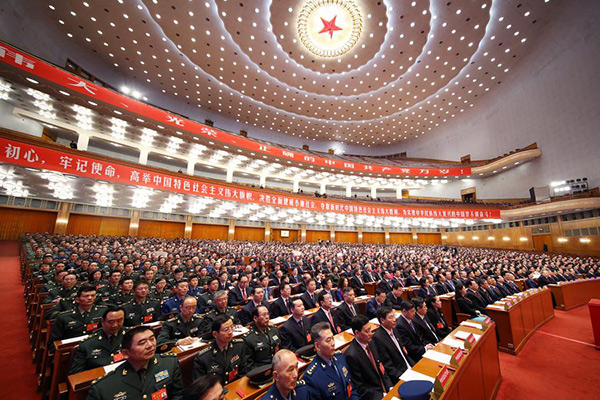
Delegates attend the closing session of the 19th National Congress of the Communist Party of China (CPC) at the Great Hall of the People in Beijing, capital of China, Oct 24, 2017. [Photo/Xinhua]
VIENNA — The recently concluded 19th National Congress of the Communist Party of China (CPC) marks a new era for China, said renowned world futurists John and Doris Naisbitt.
The global game is changing, and the leader in this change is China, the Naisbitts said in a recent interview with Xinhua.
“The 19th CPC National Congress is marking a new era. Reforms under Deng Xiaoping started more than 30 years ago. China has shifted from manufacturing to innovation, and is now rising to a higher level of a leading position in many new technologies,” said the American-Austrian couple, authors of “Innovation in China: the Chengdu Triangle.”
“A very timely shift in the nature of China’s economy,” they said.
China’s position, role and image have changed in the world. “China has stepped into the center of the global community. It has become the big story, and that makes a huge difference,” said John.
John has been visiting China for 50 years and he experienced the significant changes of China on the ground. During this long period, he witnessed the shift from outright poverty of the country, to decades of improvement, to, as he often calls it, the present “global game change.”
The couple knows China well, thanks in large part to years of research on the city and village level in almost all provinces.
“Western nations have dominated the world for the past 200 years, and many people are reluctant to believe that this era is coming to an end,” John added.
He said many Western people who are criticizing China have never been to China and know little about China.
“Ever since ‘Megatrends Asia’ in 1995, we have written about China’s very positive development. And so far, we have been right. In ‘China’s Megatrends,’ published in 2010, we continued to see China’s future as very optimistic,” said Doris.
He and his Austrian wife said they believe the leadership of the CPC plays a key role in China’s achievements.
Without the strategic planning of the CPC, China would not have been able to develop that fast, they said.
In their eyes, China’s approach is something like “framing the forest but letting the trees grow.”
A frame always holds some restrictions, but it can also be seen as providing security and stability, they said, adding that the trees in the forest, big and small, “all have the opportunity and freedom to grow.”
They said they believe the approach to highlight the CPC’s leadership allows greater efficiency, enabling China to act and react much faster to changing conditions, and make necessary adjustments and corrections.
“It works very well within China’s own system,” Doris said, adding that China’s history and culture differ greatly from those of Western countries.
They also noted that the CPC’s goals have been in harmony with the Chinese people’s.
For example, China’s efforts over the past decades were focused on infrastructure construction, which is key to reducing poverty, they said, pointing out that no country has lifted more people out of poverty than China.
Now, China’s Belt and Road Initiative signifies a global step in that direction. It is offering potential prosperity to numerous countries that span its planned routes, they added.
The two scholars pointed out that Africa has already benefited from China-supported and China-financed infrastructure projects. In the long run, China is building the infrastructure necessary to make investments possible, they said.
Meanwhile, the futurist couple praised China’s technological achievements in such areas as robotics, green energy and high-speed trains, which they said have made innovation a key driver for a prosperous future for China.
